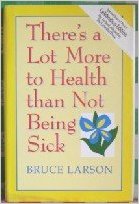On this blog we explore the HEART of HEALTH
Many years ago Bruce Larson wrote,
“There’s a Lot More to Health Than Not Being Sick .” 
He proposed health is not just the opposite of un-health, disease, illness, informity- and I agree.

I have seen this proven in the lives of countless patients.
I have treated patients who did not have a diagnosed disease, but yet did not feel or act healthy. Other patients who had a long list of ailments still managed to live active, healthy lives.
Defining Health
The WHO, World Health Organization, says
“Health is a state of complete physical, mental and social well-being and not merely the absence of disease or infirmity.”
(The bibliographic citation for this definition is: Preamble to the Constitution of WHO as adopted by the International Health Conference, New York, 19 June – 22 July 1946; signed on 22 July 1946 by the representatives of 61 States (Official Records of WHO, no. 2, p. 100) and entered into force on 7 April 1948. The definition has not been amended since 1948.)

Health in 7 Dimensions
I recently discovered a definition of health that includes those points but goes even further. The University of California, Riverside, Human Resources department promotes wellness among its staff and students with a Seven Dimensions of Wellness program.
This program considers aspects of life which you might not think impact health but do significantly affect wellbeing, or the lack of.
Let’s look at their 7 points which I’m going to expand with my own thoughts.
Social Wellness- relating to and connecting with other people in our world.
This includes family, friends, co-workers, neighbors, even strangers.
Loneliness is a significant health problem: it contributes to ill health, and even risk of dying prematurely.
The New York Times health writer Jane Brody reviewed medical studies that show
Social interaction is critical for mental and physical health
Emotional Wellness- understanding our feelings and coping with life challenges.
Emotionally well people understand that feeling angry, sad, fearful or stressed will happen, and are able to not let those feelings cripple them. They use the times of hope, love, joy and happiness to build a reserve on which to draw in difficult times.
Spiritual Wellness – what brings, peace, harmony, and purpose to our lives.
Our sense of ethics, morals, right, and wrong is usually based on what we believe to be true and meaningful,  and likely involves faith and support for an organized belief system or religion. Without belief in something, our lives can drift aimlessly and we can fall into restlessness, doubt our purpose, and lose hope for the future.
and likely involves faith and support for an organized belief system or religion. Without belief in something, our lives can drift aimlessly and we can fall into restlessness, doubt our purpose, and lose hope for the future.

Environmental Wellness – how you feel about where you live and work.
Whether it’s your own home, your neighborhood, city, country, or the world, your environment can make you feel safe and protected , or can make you feel uncomfortable and insecure, depending on the quality of the air, water, and physical surroundings.
Where you live often determines your access to basic services and goods necessary for health and wellness, what doctors call the social determinants of health such as
- doctor’s and dentist’s offices
- hospitals
- pharmacies
- grocery stores that sell nutritious food
as well as access to schools, church, jobs, entertainment.

Environment may even change our genetic makeup. According to an article shared at Smithsonian.com
“A team of researchers from Northwestern University led by anthropology professor Thom McDade have shown that DNA can also be modified by your environment during childhood. What’s more, the authors conclude in the journal Proceedings of the National Academy of Sciences, those modifications can affect how or when you develop certain illnesses during adulthood.”
Occupational Wellness- finding personal fulfillment from our jobs or our chosen career .
Feeling that we are contributing to the society we live in, whether it’s through employment, voluntary service, or nurturing a family unit can give us a sense of accomplishment and self-worth.
When you realize that we often spend the majority of our waking hours at work, you can see why work has a major impact on our health. In my medical practice, I frequently encounter patients with job problems that impact their health. This includes
- physical demands, exposure to dangerous substances, environments, and situations
- time demands, shift work, long hours, lack of time off
- job insecurity due to uncertain employer stability, unclear job expectations, inadequate training
- interpersonal conflicts with supervisors, other employees, clients, customers
These can lead to
- physical injuries
- fatigue, sleep deprivation
- feelings of stress, anxiety, depression
Read about how a bad work environment may be worse than being unemployed in this CNN report.
Bad work environment-bad for your health

Intellectual Wellness- opening our minds to new ideas and experiences in order to increase our knowledge and skills
Whether through formal education in a school or through individual learning pursuits , keeping our minds active seems to be a key to remaining fit and active as we age, and may even slow or prevent the onset of dementia, as recommended by the Alzheimer’s Association.
Stay Mentally Active.

“THE SPIRIT OF
LEARNING IS
A LASTING
FRONTIER.”
Physical Wellness- the ability to maintain a healthy quality of life that allows us to get through our daily activities without undue fatigue or physical stress.
These dimensions of health aren’t linear so much as they are circular-one leads to another. Addressing our physical health makes the other 6 easier to accomplish. In this category we would consider
- weight management
- physical activity
- avoiding substances like tobacco, alcohol, illicit drugs
- adequate quality sleep
WHO’s “Prerequisites for Health”
The World Health Organization later expanded their health definition .
They wrote, “To reach a state of complete physical, mental and social well-being, an individual must be able
- to identify and to realize aspirations,
- to satisfy needs, and
- to change or cope with the environment.
Health is a resource for everyday life, not the objective of living.
Health is a positive concept emphasizing social and personal resources, as well as physical capacities.”
I encourage you to read Rev. Larson’s book;  it’s vintage but still challenging and inspirational.
it’s vintage but still challenging and inspirational.
Explore the 7 Dimensions of Wellness page and the other information the University of California, Riverside offers to their employees and to us, and for which I thank them.
Now think about which of the 7 dimensions you need to work on, devote more attention to, or change, to reach your optimal state of wellness.
I’m certainly going to look harder at my own life to see where I need to make changes. Here are some questions to consider.
When was the last time I read a book about something I didn’t already know about?
How can I make more time for social activities with friends and family?
Is my job a source of intellectual stimulation and satisfaction, or does it drain my emotional and physical energy?

Are there habits I need to change to improve my physical well-being-lose weight, quit smoking, eat more nutritious foods?
Do I make time for goal setting, self-assessment, meditation, nurturing and practicing my faith?
Who do I need to forgive, and what situations do I need to lay aside and move on?
I would love for you to leave a comment or send me a message if you just want me to know.
Here are some other posts that might inspire you in your exploration.





Excellent post! All of those things are so vital when it comes to good health. Thank you for sharing at #BloggingGrandmothersLinkParty.
LikeLike
Thanks for reading, I’m glad to know it’s helpful.
LikeLike